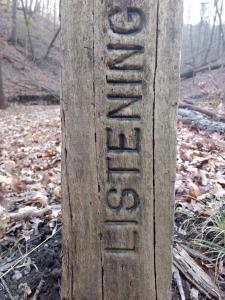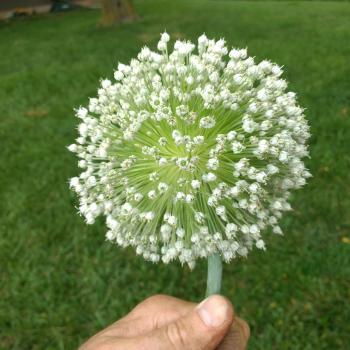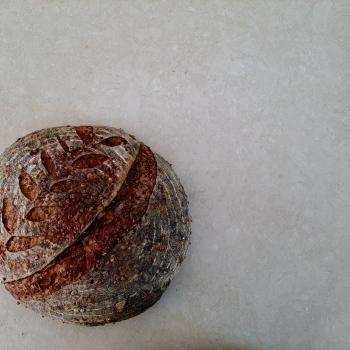
Writing flows from who we are, so Christian writing has to be rooted in our spiritual center. That means we won’t be able to write if we aren’t praying and worshiping and somehow or another putting one foot in front of the other on the spiritual journey. At least, that’s how it’s worked for me: my writing life is a tributary of my prayer life.
In part, this means writing from experience. Anne Lamott says: “Take the attitude that what you are thinking and feeling is valuable stuff, and then be naïve enough to get it all down on paper” (Bird by Bird, p.113). This means we have to learn the art of paying attention. We have to be listening to everything that’s churning around down there. The little depths of our spirit might sound like an off-center shoe on spin, but it also might just be a bar of gold.
Learning to distinguish the varied thunka-thunkas of the heart is the work of prayer. The laundry list of gimmes wears thin fast, as anyone who’s stuck with prayer for any amount of time knows. The real miracle of prayer is the I-and-Thou-ness of waiting and stillness, of entering into the presence of the One who has created and called us. That’s prayer’s joy: sitting with God in a quiet place. It’s why the greatest pray-ers have long interpreted Jesus’ words to “go into your room and shut the door and pray to your Father who is in secret” not as advice about choice of seating, but about the disposition of the heart (Matthew 6:6). Prayer begins with paying attention to ourselves and to God, and that’s where spiritual writing begins as well.
Sometimes I’ve prayed expressly looking for something to write. This is a mistake. Prayer loses something when I get in this frame of mind. Then prayer becomes a kind of smash-and-grab pillaging of the front gates of heaven.
St. Augustine wrote: “It is your heart’s desire that is your prayer; and if your desire continues uninterrupted, your prayer continues also” (Exposition on Psalm 38 (37):13). In this sense, to pray deeply and truly is to long for God. Prayer is longing. In a way, so is writing. Writing deeply and truly involves longing for something beyond ourselves. It’s not that we grasp that something-more. We can never pin it down. But it’s the longing for we-know-not-what that creates the mysterious fission that powers writing forward.
In my experience, the heart-space of prayer resembles the heart-space of writing. Both prayer and writing require us to cultivate the same habits: gratitude, vulnerability, persistence, hope. I find that when one is going well in my life, so is the other. In this way, writing becomes a kind of prayer for me. To shake up that old saying about singing: “to write is to pray twice.”













